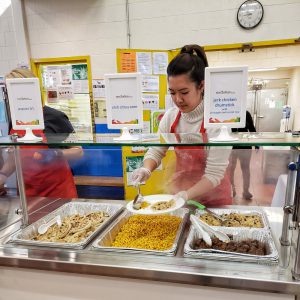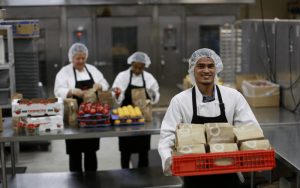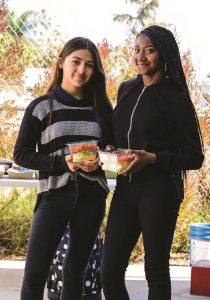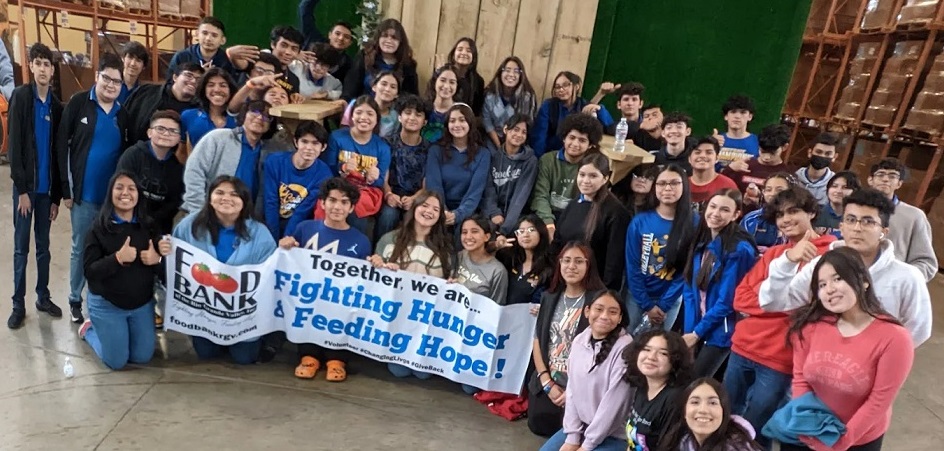“We want to do good. We see business as a force for good”: Revolution Foods, CA

Revolution Foods is a local California-based company. It was founded in 2006 with the aim of filling the nutrition gap at the school level with freshly prepared, healthy meals that would inspire better learning outcomes and eating habits. They made Revolution Foods one of the first sustainable Certified B Corporations in 2009 and a Public Benefit Corporation (PBC) in 2021.

Now, after nearly two decades and a half a billion meals later, Revolution delivers nutrition and hope to thousands of students across California and Nevada.
California has approximately six million school-age students, the largest single-state enrollment number in the United States. That’s unsurprising, given that California has the largest statewide population and an economy so massive that it exceeds that of many countries. What is shocking is that one-fifth, or 1,200,000 kids between the ages of five and 18, do not have regular access to food in California. They rely on school-provided meals as their only healthy meal and, in some cases, their only meal of the day.

In 2021, a Pasadena native Dom Engels joined Revolution Foods as CEO, leaving Stone Brewing, the ninth-largest US craft brewer, in 2020. He said he spent 25 years working in everything from the golf industry (he was a star golfer at Dartmouth College and worked in San Diego’s “Titanium Valley”) to brands representing California’s top crops. “I’ve done pistachios, almonds, mandarins, pomegranates, chocolate, hydroponic lettuce, to name a few. Water and craft beer, of course.” Today, he serves on several boards and brings a unique perspective to the Revolution table.
Having joined during the pandemic, Engels says that the period had a silver lining among the hardships of lockdowns and school closures: it shined a light on food insecurity and the challenges his business faced. State, local, and federal government entities financially support the school lunch and breakfast programs. “The pandemic helped lift up that support,” he says, “It raised the level of awareness for what we do and helped us design a better business for the future. In good times and bad, schools a vital depot for food to successfully reach the children that need it.”

Based in Commerce, California, near Los Angeles, Revolution Foods has culinary centers in Commerce and San Lorenzo, near the Bay Area, and one distribution facility in Las Vegas. Meals are freshly prepared and delivered daily via 150 climate-controlled trucks. Various menus are offered to schools on a three-week cycle menu and a fourth week of favorites. Engels says favorites often include tamales, papusas, and conchas. “You could theoretically have something different for 30 days,” he says. “We hold ourselves accountable to bringing a significant amount of variety.”

Revolution Foods are flexible and responsive. In December of 2023, one local school called Revolution from the Los Angeles Zoo grounds, where busloads of students were enjoying a field trip. The school admitted that they had forgotten to order lunches for their off-site adventure, so the team at Revolution quickly prepared a few hundred brown-bag lunches and delivered them directly to the zoo entrance.

“We want to be a good citizen of planet Earth, a good citizen of our communities, a good citizen of our customers, as well as our employees and shareholders of course. It’s just part of our DNA,” Engels says. “We have a mission-driven focus. This mission has endured since 2006.”
“We are a purpose-driven company focused on delivering our healthy school meals to students who really need them,” he explains. As part of their Public Benefit Corporation responsibility, delivery statistics are measured and made public. “Our meals, 63 percent of the time, reach kids that depend on these meals as their healthiest meals, if not their only meals of the day.” He says that in Southern California, eight out of ten meals truly reach the right kids.
The motivation to do good compels the team on a family level because many children of Revolution Foods’ employees attend a school where their meals are served. “There’s a virtuous connection here, between not only our employees but also the communities, and it’s deep.”
Being a Certified B Corp means, on the surface, that the company has met social and environmental standards, which is a challenge but important to everyone there. When the brand acquired its main competitor, Better 4 You Meals, in 2022, it re-certified the combined company as a B Corp and received an even higher score.

To younger brands who want to become certified, Engels encourages them to go for it but do it with the right intentions. “I think it’s important to do it from a sincere standpoint. It’s got to be deep and from within, not ‘pasted’ on.” Even if a brand can’t become certified, he urges them to make social and environmental commitments. “Every little bit matters. If you can make some kind of commitment, even if it’s stopping short of being a B Corp but taking on a set of values related to the economy, community, governance, or employees, that matters. Then you’re coming at it from a point of authenticity and depth that I think translates to a fulfilling experience for your employees, and ultimately for society.”
The brand’s reach extends beyond school cafeterias, too. While chartered for kids, Revolution recognizes that a third of senior citizens in California are food insecure. The company launched a direct-to-consumer program in Los Angeles County and Kern County, delivering frozen five-meal boxes to seniors’ homes weekly. It’s only two percent of their business right now. “We see this part of our business growing rapidly,” he says. “We are proudly ramping-up now for a large-scale senior feeding program for LA City,” Engels added.

Engels is eyeing growth of a different kind, too. With two years of work as Revolution Foods’ CEO under his belt, Engels says they’re ready to evaluate growth in other sectors and states. The brand recently turned into a perpetuity model, meaning it can proceed into the future on a self-sustaining basis. “It’s the ultimate accomplishment for a B Corp or any mission-driven company. When you can take a business, a for-profit business with a positive mission, and turn that into a perpetuity model, where it self-funds itself and self-funds its growth, that is what we want to do. We make affordable, nutritious meals at-scale. And we want to do it everywhere we possibly can. I’m quite proud of that.”
By Gilbert Castro | ENC News



































